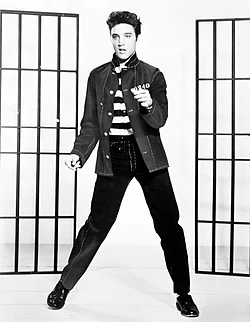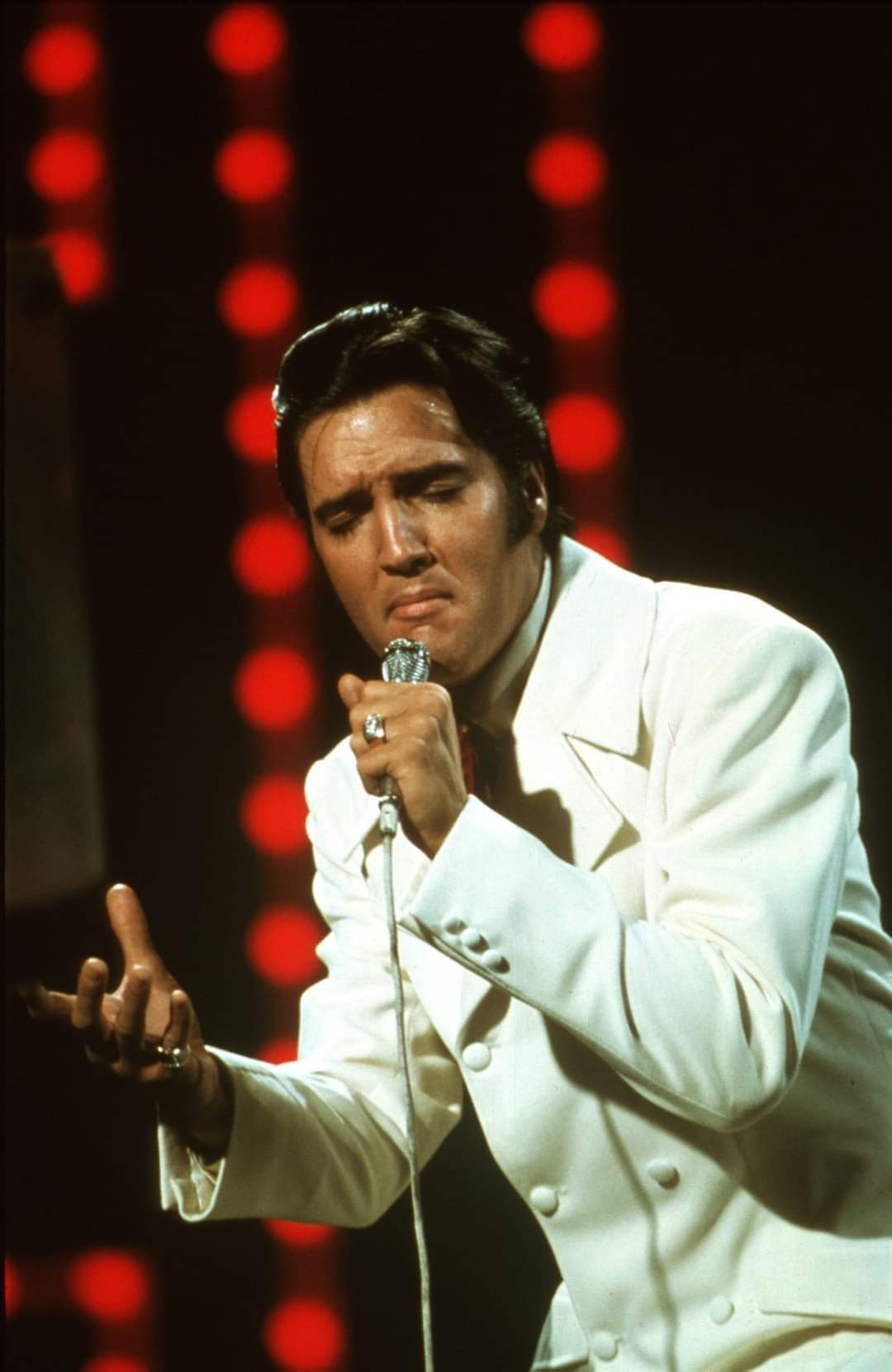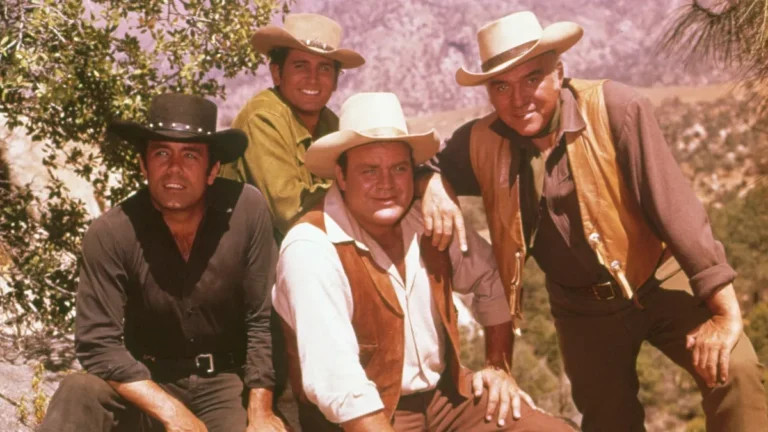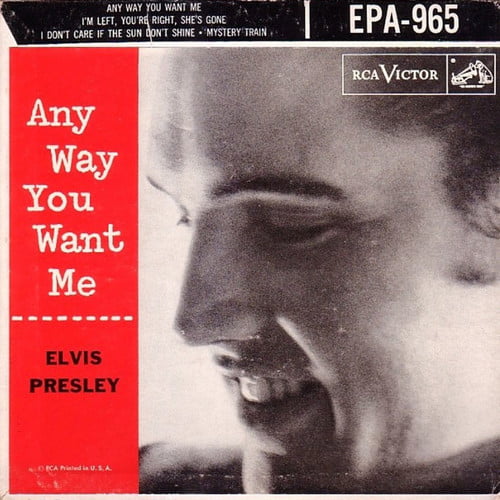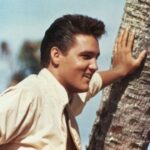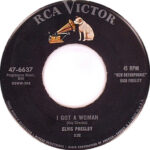
ELVIS – “Four Hands, Two Minds, One Heart: The NBC TV SPECIAL”
By Rosa García Mora and Mahnuel Muñoz
June 1968. Bill Bellew was in charge of immortalizing in our retinas the image of an Elvis of captivating sexuality, so that it would be eternally linked to his return and his resurrection.
A statuesque Elvis Presley, wrapped in soft and tight black cordovan leather, with a Napoleonic high collar, which further frames the beauty of his face, is backstage at the NBC studios, trembling and scared. He doesn’t want to go on stage, fear paralyzes him. Too many years away from his beloved audience, playing at being an actor. He has worked very hard to become the cultural icon that revolutionized America, but the time has come to go on stage and the ghosts catch him again…

Perhaps his mind travels to times past, to those first performances in which nervousness caused the movements that, involuntarily, became one of his most characteristic features; Maybe he’ll relive the day Steve Allen mocked him by making him sing for a dog on television, or the failure of his early foray into Las Vegas. Would they laugh at him again? Would they ignore him?
“Steve, I can’t do it… my mind is completely blank and I don’t remember anything I sang in rehearsals…” he told Steve Binder, the show’s producer and director. But Steve had always believed in Elvis; He loved him, admired him, trusted him and took him firmly by the hand.
Binder was the person who brought Elvis back to his rebirth as an artist, and he wanted that Comeback Special to be a radical turn in his career. He had the genius of bringing out the best in Elvis at all times. The day he passed through the door of his dressing room and saw the most intimate Elvis in the spontaneity of his music, singing with his friends, he knew that this was the Elvis he wanted for the program: a pure Elvis, without artifice, just as it was. In this way, from his brilliant mind came the idea of ??what would become the most authentic passage of the Special: Elvis surrounded by his friends in the sit down ring, once again giving us all the best of himself. .
Elvis returned, in the sit downs, to the origins of his art and his joy: music was once again a means of expression and communication for a man whose identity gasped under the weight of his image, an artist who had seen his potential. cut by the edge of contractual commitments and economic benefit. In the ring Elvis fought hard against the frustration, doubts and masks that, over the last decade, had been distorting the image of the American dream that he came to embody. At 33 years old he was once again as visceral, seductive and unclassifiable as when he took the crown of popular music at the age of 21, or even more so, if possible; The classics from his repertoire that Elvis covered with the same leather that hugged his own body sounded wilder, fresher and cleaner than ever.
He was no longer the boy who stood on tiptoe when he sang, the singer condemned by reverends, deputies and parents’ associations; He was a mature Elvis, but one who maintained his roots and his values. But the definitive test for him was yet to come, he had not yet faced the final challenge: performing alone in front of his audience. That day, his friends would no longer be sitting next to him and that ring would be empty; only him, the orchestra in the shadows, his fears, his immense greatness and his audience. Elvis would come out to the ring with overwhelming strength, an aggressive, sexual spirit and full of courage. Despite his ghosts, his voice would start in a heartbreaking way, presaging a majestic show; Here was that more mature Elvis again, with feline strength and renewed sexuality and vitality. His performance would captivate the public, with the strength of the artist who sings from his core, with the spirit that he never lost. Elvis had reaffirmed his resurrection.
The show also tried to tell a story, in some ways based on Elvis’s own biography. In different dramatized and choreographed sections, with the theme “Guitar Man” as a leitmotif, the king played a guitarist in search of fame, fortune and a place in the world, who along the way encountered hostile and tempting characters who put him at risk. tests his mettle and his principles. The climactic moment of the narrative comes when the guitarist feels the need to hold on to his faith and bears witness in the form of a vigorous medley of spiritual songs with which he shares his mystical journey. Once again, like so many others throughout Elvis’ career and life, religious music serves as a beacon to the man and exposes the artist in the purest and most brilliant version of him.

This gospel segment of the program worried Elvis in a very special way, but on this occasion, not because he was afraid of the results. His concern was due to the great respect that singing to his God entailed for him, for him it was something very personal and intimate, since the gospel made an imprint on him to his very essence, from the first day he attended Church in his Tupelo native. Steve planned it as a double segment: on the one hand there would be a medley with his gospel songs, and on the other, since Steve always loved dancers, there would be a dance number. That is why this sequence begins performed by the dancer Claude Thompson, who when he disappears from the scene, makes way for a group of beautiful women dressed in white and men dressed in black, with an impressive Elvis in the background of the scene, singing in prayer to his God, impeccably dressed in the color of the same blood shed on the cross.
Elvis would continue singing gospel music after this program, and his music would always be infused with it, but he would never again make such a resounding declaration of intent as the one he made in this medley. This would be another of the great moments of this Special.
But during the making of the program, Elvis, in addition to that internal struggle with his insecurities, was also devastated by the recent assassinations of Martin Luther King and Robert Kennedy.
Elvis would spend a lot of time talking to Steve Binder about these assassinations and the situation in his country, expressing his sincere wishes for brotherhood and his dream of building a better world.
It was at that moment when Binder had a new insight and knew that Elvis had an important message to convey to his country and the world. And it was this feeling of Elvis that led to the creation of the song ”If I Can Dream”; a song in tribute to Martin Luther King, which directly alluded to his 1963 speech, “I Have a Dream.”
Steve Binder could not allow his program to end with a Christmas song, as the colonel had planned, and overwhelmed by Elvis’ desolation, he had a new initiative, one of those that made him a genius and he told Walter Earl Brown, in charge of vocal arrangements: “Write me the best song you’ve ever written”
And for that dreamy Elvis, eager to convey a message of peace and understanding, Brown created “If I Can Dream.”

Let’s close our eyes for a moment and imagine Elvis in the studio, singing with the lights off, completely absorbed in the song, microphone on the floor and prostrate on his knees.
Tears fell down the cheeks of the chorus girls and no one present had ever witnessed such an emotional and heartbreaking scene.
When Elvis performed the song for the program, he did it with such emotion and passion that he sang as if his dream were our dream, it was the cry of an artist immersed in deep lament.
At the end of the song Elvis raises his arms, almost in a crucifixion posture, as if his singing had drained his own essence, making the music bleed and opening our souls wide to his message.
As a whole, the program caused a deep catharsis in Elvis Presley, making him regain his lost confidence and connecting him with the primary sources of his art, which were none other than honest music and direct contact with the audience. The moment could not be more propitious; Elvis’s career seemed to be drifting. The pioneer par excellence of rock and roll had remained oblivious to the dramatic changes suffered by the musical style that he helped to build and by the world that he danced to the rhythm of his first hymns. In the years in which rock transcended its role as a clarion call for individual freedom and youthful rebellion to become the speaker of social struggle in a turbulent and hostile world, Elvis wasted his talent and his ability to communicate, tied to a chain. too long of insubstantial films with their respective soundtracks. Any other artist with a lesser minimum of solidity would not have withstood such a journey through the desert, but the great talent that Elvis never stopped having blossomed again to reach an unprecedented splendor thanks to the chemical reactions caused by the correct music and lyrics.
With the exceptions of “If I Can Dream” and later “In The Ghetto”, “Walk A Mile In My Shoes” and some other pieces, after the Comeback Special Elvis did not become an explicit spokesperson for the social struggle, but his music It acquired a personality and depth that shocked its former followers and attracted countless new followers, achieving a different kind of communion whose longevity has far surpassed any of the sociocultural manifestations of that era: the hippy movement today is dead and buried, while the collective of people touched and transformed by Elvis remains ardently alive.

Since the “death” of the old Elvis and subsequent “resurrection”, the king’s lyrical speech emerged, magnified, from the deepest introspection into his own soul. Particularly, the songs of love and heartbreak became direct projections of his own life experience. Spiritual music took a leading role in the concerts, whether performed explicitly or permeating, in the form of a musical arrangement or interpretive approach, Elvis’ entire repertoire. The Comeback Special is a basic component in the perennial popularity of Elvis, as much or even more than his spectacular emergence and global expansion in the 1950s, as it was the prelude to the most controversial, intense and human stage of the artist.
The years in which true fans strengthened their commitment to the king and those who only admired the youthful stereotype were unmasked.
Article written and provided by Rosa García Mora https://www.facebook.com/rosa.garciamora.12 y Mahnuel Muñoz https://www.facebook.com/mahnuelmunozoficial
If you want to visit more articles about the life of Elvis Presley, enter the following Elvis Radio 24h link: https://elvisradio24h.com/tag/articles Thanks TCB ?
We remind you that you can also listen to Elvis Radio 24 hours on your mobile phone by downloading our free applications for Android in the Play Store ? https://play.google.com/store/apps/details?id=com.icreo.elvisradio24h1, and for iPhone in your Apple Store ? https://apps.apple.com/app/elvis-radio-24h/id6444257119. Thank you very much!!…
